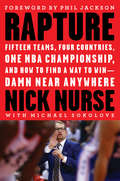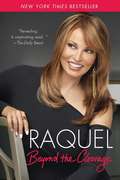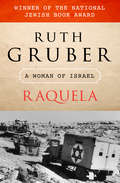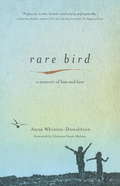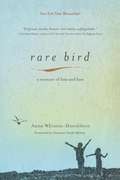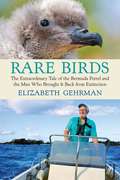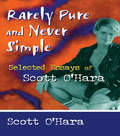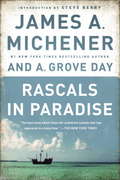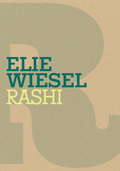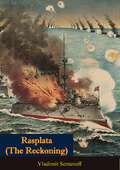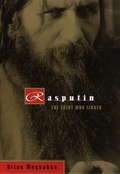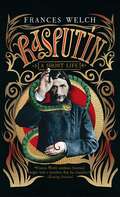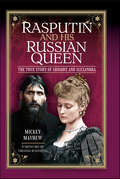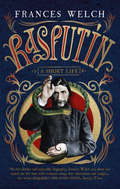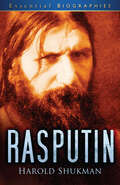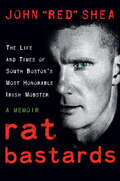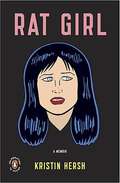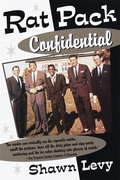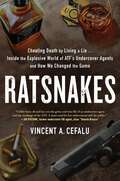- Table View
- List View
Rapture: Fifteen Teams, Four Countries, One NBA Championship, and How to Find a Way to Win -- Damn Near Anywhere
by Nick NurseNick Nurse distills the wisdom, insight, and experiences that helped him lead the Toronto Raptors to the NBA championship in his first year as head coach. Foreword by Phil Jackson. NBA fans had modest expectations for rookie coach Nick Nurse and his Toronto Raptors. But what those naysayers didn't realize was that Nurse had spent the past thirty years proving himself at every level of the game, from youth programs and college ball to the NBA D League and Britain's struggling pro circuit. While few coaches have taken such a circuitous path to pro basketball's promised land, the journey-which began at Kuemper Catholic high school in Carroll, Iowa-forged a coach who proved to be as unshakable as he is personable. On the road, he is known to bring his guitar and keyboard for late-night jazz and blues sessions. In the locker room, he's steadfast and even-keeled regardless of the score. On the court, he pulls out old-school tactics with astounding success. A rookie in name but a veteran in attitude, Nurse is seemingly above the chaos of the game and, with only two seasons on his résumé, has already established himself as one of the NBA's most admired head coaches. Now, in this revealing new book-equal parts personal memoir, leadership manifesto, and philosophical meditation-Nurse tells his own story. Given unprecedented access inside the Raptors' locker room, readers get an intimate study of not only the team culture he has built, but also of a rookie coach's unique dynamic with the star players-such as Kawhi Leonard, Kyle Lowry, and Pascal Siakam-who helped trailblaze the 2019 championship run. As much for readers of Ray Dalio as for fans of John Wooden and Pat Summitt, Rapture promises to be a necessary read for anyone looking to forge their own path to success.
Raquel
by Raquel WelchShe didn’t hatch out of an eagle’s nest, circaOne Million Years B. C. , clad in a skimpy fur bikini. She didn’t aspire to fame as a sex symbol. Yet, for many years after making her Hollywood entrance as every man’s fantasy, Raquel Welch was best known for her beauty and sex appeal. A private person, she allowed people to draw their own conclusions from her public image. Now, Raquel Welch is ready to speak her mind. And, with the luxury of hindsight and the benefit of experience, she has plenty to share about the art of being a woman—even men will find it enlightening to read about what makes her tick. InBeyond the Cleavage, Raquel Welch talks, woman to woman, about her views on all that comes with being a member of the female sex—love, sex, style, health, body image, career, family, forgiveness, aging, and coming of age. Looking back on her life, she lets women in on her childhood, dominated by a volatile father; her first love, marriage, and divorce; her early struggles as a single working mother in Hollywood; her battles for roles and respect as an actress; and her daring decision never to lie about her age. Looking forward, she offers women a compass to guide them at every crossroad of life, from menopause through the empty nest years, to dating younger men and beyond. Along with bringing baby boomers into her confidence—she offers essential tips for staying motivated and positive past fifty, as well as divulging her secrets for fabulous hair and makeup—she even talks to today’s younger generation of women about the importance of carrying themselves with dignity and self-respect. With warmth, humor, conviction, and honesty, Raquel reveals her approach to preventative aging, her life-changing commitment to yoga, her recipe for eating right, her skincare regimen, her flair for fashion, and much more. Deeply personal (Welch wrote every word herself—no ghostwriter),Beyond the Cleavageis Raquel Welch’s gift to every woman who longs to look and feel her best, and be at peace with herself.
Raquel
by Raquel WelchPart autobiography, part personal philosophy, and full of practical advice for women of all ages, "Raquel: Beyond the Cleavage" is a book that skimps neither on entertainment nor on good plain advice.
Raquel: Beyond the Cleavage
by Raquel WelchShe didn't hatch out of an eagle's nest, circa One Million Years B.C., clad in a skimpy fur bikini. She didn't aspire to fame as a sex symbol. Yet, for many years after making her Hollywood entrance as every man's fantasy, Raquel Welch was best known for her beauty and sex appeal. A private person, she allowed people to draw their own conclusions from her public image. Now, Raquel Welch is ready to speak her mind. And, with the luxury of hindsight and the benefit of experience, she has plenty to share about the art of being a woman--even men will find it enlightening to read about what makes her tick. In Beyond the Cleavage, Raquel Welch talks, woman to woman, about her views on all that comes with being a member of the female sex--love, sex, style, health, body image, career, family, forgiveness, aging, and coming of age. Looking back on her life, she lets women in on her childhood, dominated by a volatile father; her first love, marriage, and divorce; her early struggles as a single working mother in Hollywood; her battles for roles and respect as an actress; and her daring decision never to lie about her age. Looking forward, she offers women a compass to guide them at every crossroad of life, from menopause through the empty nest years, to dating younger men and beyond. Along with bringing baby boomers into her confidence--she offers essential tips for staying motivated and positive past fifty, as well as divulging her secrets for fabulous hair and makeup--she even talks to today's younger generation of women about the importance of carrying themselves with dignity and self-respect. With warmth, humor, conviction, and honesty, Raquel reveals her approach to preventative aging, her life-changing commitment to yoga, her recipe for eating right, her skincare regimen, her flair for fashion, and much more. Deeply personal (Welch wrote every word herself--no ghostwriter), Beyond the Cleavage is Raquel Welch's gift to every woman who longs to look and feel her best, and be at peace with herself.
Raquela: A Woman of Israel
by Ruth GruberA National Jewish Book Award–winning biography: A look at the early years of Israel&’s statehood, experienced through the life of a pioneering nurse.During her extraordinary career, nurse Raquela Prywes was a witness to history. She delivered babies in a Holocaust refugee camp and on the Israeli frontier. She crossed minefields to aid injured soldiers in the 1948 Arab-Israeli War and organized hospitals to save the lives of those fighting the 1967 Six-Day War. Along the way, her own life was a series of triumphs and tragedies mirroring those of the newly formed Jewish state.Raquela is a moving tribute to a remarkable woman, and an unforgettable chronicle of the birth of Israel through the eyes of those who lived it.
Raquela: A Woman of Israel
by Ruth GruberA National Jewish Book Award–winning biography: A look at the early years of Israel&’s statehood, experienced through the life of a pioneering nurse.During her extraordinary career, nurse Raquela Prywes was a witness to history. She delivered babies in a Holocaust refugee camp and on the Israeli frontier. She crossed minefields to aid injured soldiers in the 1948 Arab-Israeli War and organized hospitals to save the lives of those fighting the 1967 Six-Day War. Along the way, her own life was a series of triumphs and tragedies mirroring those of the newly formed Jewish state.Raquela is a moving tribute to a remarkable woman, and an unforgettable chronicle of the birth of Israel through the eyes of those who lived it.
Rare Bird
by Glennon Melton Anna Whiston-DonaldsonI wish I had nothing to say on the matter of loss, but I do. Because one day I encouraged my two kids to go out and play in the rain, and only one came home....________________________________________________________________________ Are you brave enough to step into the light? On an ordinary September day, twelve-year-old Jack is swept away in a freak neighborhood flood. His parents and younger sister are left to wrestle with the awful questions: How could God let this happen? And, Can we ever be happy again? They each fall into the abyss of grief in different ways. And in the days and months to come, they each find their faltering way toward peace. In Rare Bird, Anna Whiston-Donaldson unfolds a mother's story of loss that leads, in time, to enduring hope. "Anna's storytelling," says Glennon Doyle Melton, "is raw and real and intense and funny." With this unforgettable account of a family's love and longing, Anna will draw you deeper into a divine goodness that keeps us--beyond all earthly circumstances--safe.This is a book about facing impossible circumstances and wanting to turn back the clock. It is about the flicker of hope in realizing that in times of heartbreak, God is closer than your own skin. It is about discovering that you're braver than you think.Praise for Rare Bird"In her beautiful, clear-eyed prose Anna brings to life complex miracles: that the anchor of being strong is tied to feelings of unbearable weakness; that the ache of grief is often accompanied by glittering beauty; and that all we do not understand is more important to making sense of life than what we know. Her story, as well as Jack's story, is gorgeous, bold and true, and no one will be unchanged in reading it."-- Stacy Morrison, Editor in Chief, BlogHer; author of Falling Apart in One Piece"This is not a book; it is a kaleidoscope. With every turn of the page, a new discovery is made that forever alters your view of pain, joy, heartache, time, hope, and healing. As I journeyed through Anna's divinely written prose, I found myself unable to stand by as a passive recipient of her message. I needed to act. Because of Anna and Jack, I talked with my child about heaven. I walked around the pool's edge to sit beside a grieving woman. I looked into the darkest places of my soul and for the first time, I did not look away. If you yearn to stop hiding from that which prevents you from truly living, step into the kaleidoscope that is Rare Bird. Turn the page--wake up, stand up, comfort, love, and live. Turn the page--let your eyes be opened to the light that exists in whatever darkness you face."-- Rachel Macy Stafford, New York Times best-selling author of Hands Free Mama"A masterpiece of hope, love, and the resilience and ferocity of the human spirit."-- From the foreword by Glennon Doyle Melton, Momastery.com; author of Carry On, Warrior "Rare Bird is not just another well-written story of love, loss, and the aftermath of death, but it is a story that clearly shows the constant presence and grace of a loving God. It gives assurance and comfort to those whose hearts are grieving, and hope to those who are afraid."-- Mary C. Neal, MD, New York Times best-selling author of To Heaven and BackFrom the Hardcover edition.
Rare Bird: A Memoir of Loss and Love
by Glennon Melton Anna Whiston-DonaldsonI wish I had nothing to say on the matter of loss, but I do. Because one day I encouraged my two kids to go out and play in the rain, and only one came home. . . . Now a New York Times bestseller! On the other side of heartbreak, a story of hope rises. On an ordinary September day, twelve-year-old Jack is swept away in a freak neighborhood flood. His parents and younger sister are left to wrestle with the awful questions: How could God let this happen? And, Can we ever be happy again? They each fall into the abyss of grief in different ways. And in the days and months to come, they each find their faltering way toward peace. In Rare Bird, Anna Whiston-Donaldson unfolds a mother's story of loss that leads, in time, to enduring hope. "Anna's storytelling," says Glennon Doyle Melton, "is raw and real and intense and funny. " With this unforgettable account of a family's love and longing, Anna will draw you deeper into a divine goodness that keeps us--beyond all earthly circumstances--safe. This is a book about facing impossible circumstances and wanting to turn back the clock. It is about the flicker of hope in realizing that in times of heartbreak, God is closer than your own skin. It is about discovering that you're braver than you think.
Rare Birds: The Extraordinary Tale of the Bermuda Petrel and the Man Who Brought It Back from Extinction
by Elizabeth GehrmanThe inspiring story of David Wingate, a living legend among birders, who brought the Bermuda petrel back from presumed extinction David Wingate is known in Bermuda as the birdman and in the international conservation community as a living legend for single-handedly bringing back the cahow, or Bermuda petrel—a seabird that flies up to 82,000 miles a year, drinking seawater and sleeping on the wing. For millennia, the birds came ashore every November to breed on this tiny North Atlantic island. But less than a decade after Bermuda’s 1612 settlement, the cahows had vanished. Or so it was thought until the early 1900s, when tantalizing hints of their continued existence began to emerge. In 1951, two scientists invited fifteen-year-old Wingate along on a bare-bones expedition to find the bird. The team stunned the world by locating seven nesting pairs, and Wingate knew his life had changed forever. He would spend the next fifty years battling natural and man-made disasters, bureaucracy, and personal tragedy with single-minded devotion and antiestablishment outspokenness. In April 2009, Wingate saw his dream fulfilled, as the birds returned to Nonsuch, an island habitat that he had hand-restored, plant-by-plant, giving the Bermuda petrels the chance they needed in their centuries-long fight for survival.
Rarely Pure and Never Simple: Selected Essays of Scott O'Hara
by Scott O' HaraA follow-up to O’Hara’s steamy and provocative book Autopornography: A Memoir of Life in the Lust Lane, Rarely Pure and Never Simple: Selected Essays of Scott O’Hara shares with you more intimate stories from former porn star Scott O’Hara. You’ll gain an even deeper sense of the man behind the “Biggest Dick in San Francisco” and come to understand his take on porn, sex, life, and loss. Discussing his ventures as a writer, playwright, and editor of the popular but short-lived journal Steam, Rarely Pure and Never Simple includes poems and stories by O’Hara that express his opinions and feelings about monogamy, safe sex, male beauty, morality, social politics, and “being queer.” O’Hara also relates his childhood experiences to his adult life and uses many examples to link the past to his actions and thoughts concerning his sexuality.Bold, personal, and honest, Rarely Pure and Never Simple gives you an inside look into the life of this controversial author, who died in February 1998 of AIDS-related complications. O’Hara challenges the “norms” of society as he discloses intimate thoughts and details about his sex life and fantasies that are guaranteed to arouse your . . . curiosity.
Rascals in Paradise: Turbulent Adventures and Bold Courage on the South Seas
by James A. Michener A. Grove DayIn a thrilling collection of nonfiction adventure stories, James A. Michener returns to the most dazzling place on Earth: the islands that inspired Tales of the South Pacific. Co-written with A. Grove Day, Rascals in Paradise offers portraits of ten scandalous men and women, some infamous and some overlooked, including Sam Costock, a mutinous sailor whose delusions of grandeur became a nightmare; Will Mariner, a golden-haired youth who used his charm to win over his captors; and Captain Bligh, the notorious HMS Bounty captain who may not have been the monster history remembers him as. From lifelong buccaneers to lapsed noblemen, in Michener and Day's capable hands these rogues become the stuff of legend. BONUS: This edition includes an excerpt from James A. Michener's Poland. Praise for Rascals in Paradise "The best book about those far-scattered islands that has appeared in a long time . . . a portfolio of rare and ruthless personalities that is calculated to make the curliest hair stand straight on end."--The New York Times "[Combines] research and scholarship (A. Grove Day was a professor at the University of Hawaii) with a gift for spinning a yarn and depicting character (Michener, journalist and novelist, needs no introduction)."--Kirkus Reviews
Rasheed Ahmad Siddiqui
by Suleiman Akhtar Javed Rakhshanda JalilOn the life and works of Rasheed Ahmad Siddiqui, 1894-1977, Urdu writer.
Rashi
by Elie Wiesel Catherine TemersonFrom Elie Wiesel, winner of the Nobel Peace Prize, comes a magical book that introduces us to the towering figure of Rashi--Rabbi Shlomo Yitzchaki--the great biblical and Talmudic commentator of the Middle Ages. Wiesel brilliantly evokes the world of medieval European Jewry, a world of profound scholars and closed communities ravaged by outbursts of anti-Semitism and decimated by the Crusades. The incomparable scholar Rashi, whose phrase-by-phrase explication of the oral law has been included in every printing of the Talmud since the fifteenth century, was also a spiritual and religious leader: His perspective, encompassing both the mundane and the profound, is timeless.Wiesel's Rashi is a heartbroken witness to the suffering of his people, and through his responses to major religious questions of the day we see still another side of this greatest of all interpreters of the sacred writings. Both beginners and advanced students of the Bible rely on Rashi's groundbreaking commentary for simple text explanations and Midrashic interpretations. Wiesel, a descendant of Rashi, proves an incomparable guide who enables us to appreciate both the lucidity of Rashi's writings and the milieu in which they were formed.From the Hardcover edition.
Rasplata (The Reckoning) by Commander Vladimir Semenoff.: His Diary During The Blockade Of Port Arthur And The Voyage Of Admiral Rojestvensky's Fleet
by Vladimir SemenoffImmerse yourself in the dramatic and harrowing events of the Russo-Japanese War through the firsthand account of Commander Vladimir Semenoff in "Rasplata (The Reckoning)." This gripping diary offers an unparalleled glimpse into the life of a naval officer during one of the most significant conflicts of the early 20th century, capturing the intense emotions and strategic complexities of wartime.Commander Vladimir Semenoff, a distinguished officer of the Russian Imperial Navy, chronicles his experiences during the protracted siege of Port Arthur and the perilous voyage of Admiral Rojestvensky's fleet. His detailed and candid entries provide a vivid portrayal of the hardships faced by the sailors, the strategic maneuvers employed, and the personal sacrifices made during the conflict."Rasplata (The Reckoning)" is more than a military diary; it is a deeply human story of resilience, camaraderie, and the relentless pursuit of duty amidst overwhelming odds. Semenoff’s narrative brings to life the daily struggles and extraordinary events that defined the blockade of Port Arthur, offering insights into the tactical decisions and the relentless pressure faced by the fleet.Semenoff’s reflections on the epic voyage of Admiral Rojestvensky's fleet from the Baltic Sea to the Pacific Ocean highlight the logistical challenges and the morale of the crew as they navigated treacherous waters and prepared for battle. His account of the climactic Battle of Tsushima, a pivotal moment in naval history, provides a firsthand perspective on the strategies, heroism, and tragic outcomes of the engagement.This book is an essential read for military historians, naval enthusiasts, and anyone interested in the personal experiences of those who lived through the crucible of war. Semenoff’s meticulous documentation and evocative storytelling offer a rare and compelling window into a tumultuous period of history.Join Commander Vladimir Semenoff on his remarkable journey through the trials of war, and gain a deeper understanding of the complexities and human elements of naval warfare in "Rasplata (The Reckoning)." This powerful diary stands as a testament to the courage and determination of those who served in the face of adversity.
Rasputin
by Brian MoynahanGrigory Efimovich Rasputin came to St. Petersburg from his Siberian cabin in 1903 like a projectile from the medieval past, tattered, black-clad, muttering. By the time he was murdered thirteen years later, the peasant was the "beloved" Friend of Tsar Nicholas and Empress Alexandra and the sponsor of the most powerful officials in Russia. He had become, a society lady wrote, "a dusk enveloping all our world, eclipsing the sun. How could so pitiful a wretch throw so vast a shadow? It was inexplicable, maddening, almost incredible. "Rasputin's name has become synonymous with evil, but his legend has obscured the facts of his life. In this evocative biography, Brian Moynahan presents us with a flesh-and-blood Rasputin, more fascinating than the myth--a man in whom debauchery coexisted beside a real (if erratic) spiritual sense, a man whose coarseness hid a savvy awareness of human psychology. Drawing on confidential police reports, cabinet meeting memos, and other documents, some available only since the fall of the Soviet Union, Moynahan sheds new light on Rasputin's life and disputes some of the widely held details of his death. The young Rasputin was a drinker, thief, and womanizer. He claimed to have religious visions and became a wandering holy man, preaching that exposure to sin could drive out sin. He stormed the fashionable salons of St. Petersburg, and in 1905 he met Nicholas and Alexandra, who, increasingly despised by the sophisticated, found in Rasputin reassurance that the "real Russia, the simple and pious peasantry, loved them. Rasputin's mysterious ability to stop the bleeding attacks of their hemophiliac only son, Alexis, sealed the approval of the domineering Alexandra. With royal patronage, Rasputin became increasingly reckless, partying with prostitutes, peddling influence, plotting the disgrace of those who crossed him. Ever contradictory, he was also a devoted family man, a defender of the poor, and a figure of immense charisma. As Germany battered Russia during World War I, as Nicholas's ineptitude as a leader became ever more rampant and the masses went hungry, Rasputin seemed to monarchists to be the cause, and not just the symptom, of corrupt government. A group of conspirators gathered--among them a grand duke and a scion of the richest family in Russia--and one of the most famous murders in history was planned. Set against the vivid backdrop of prerevolutionary Russia, Rasputin is a portrait of an age as well as of a man.NOTE: This edition does not include photographs.
Rasputin
by Frances WelchTold with humor, intrigue, and a shrewd eye for detail, this riveting short biography sheds much-needed light on the life of nineteenth-century Russian icon Grigory Rasputin.Grigory Rasputin, a Siberian peasant turned mystic and court sage, was as fascinating as he was unfathomable. He played the role of the simple man, eating with his fingers and boasting, "I don't even know the ABC." But, as the only person able to relieve the symptoms of hemophilia in the Tsar's heir Alexei, he gained almost hallowed status within the Imperial court. During the last decade of his life, Rasputin and his band of "little ladies" came to symbolize all that was decadent, corrupt, and remote about the Imperial Family, especially when it was rumored that he was not only shaping Russian policy during the First World War, but also enjoying an intimate relationship with the Empress... Rasputin's role in the downfall of the tsarist regime is beyond dispute. But who was he really? Prophet or rascal? A "breath of rank air...who blew away the cobwebs of the Imperial Palace," as Beryl Bainbridge put it, or a dangerous deviant? Writing for historical aficionados and curious readers alike, Frances Welch turns her inimitable wry gaze on one of the great mysteries of Russian history.
Rasputin and His Russian Queen: The True Story of Grigory and Alexandra
by Mickey MayhewRasputin’s relationship with Russia’s last Tsarina, Alexandra, notorious from the famous Boney M song, has never been adequately addressed; biographies are always for one or the other, or simply Alexandra and her husband Nicholas. In this new work, Mickey Mayhew reimagines Alexandra for the #MeToo generation: ‘neurotic’; ‘hysterical’; ‘credulous’ and ‘fanatical’ are shunted aside in favor of a sympathetic reimagining of a reserved and pious woman tossed into the heart of Russian aristocracy, with the sole purpose of providing their patriarchal monarchy with an heir. When the son she prayed for turns out to be a hemophiliac, she forms a friendship with the one man capable of curing the child’s agonizing attacks. Some say that between them, Grigori and Alexandra brought down 300 years of Romanov rule and ushered in the Russian Revolution, but theirs was simply the story of a mother fighting for the health of her son against a backdrop of bigotry, sexism and increasing secularism. Bubbling with his trademark bon mots, Mickey Mayhew’s new book breathes fresh life into two of history’s most fascinating - and polarizing - figures. She liked to pray and he liked to party, but when they found themselves steering Russia into the First World War, her gender and his class meant that society simply had to crush them. This is the real story of Rasputin and his Russian queen, Alexandra.
Rasputin: A short life
by Frances WelchGrigory Rasputin, the Siberian peasant-turned-mystic, was as fascinating as he was unfathomable. He played the role of the simple man, eating with his fingers and boasting, 'I don't even know my ABC...' But, as the only person able to relieve the symptoms of haemophilia in the Tsar's heir Alexis, he gained almost hallowed status within the Imperial court. During the last decade of his life, he and his band of 'little ladies' came to symbolise all that was decadent and remote about the royal family.His role in the downfall of the tsarist regime is beyond dispute. But who was he really? Prophet or rascal?In this eye-opening short biography, which draws on previously unpublished material, Frances Welch turns her inimitable wry gaze on one of the great mysteries of Russian history.
Rasputin: An Introduction (Essential Biographies)
by Harold ShukmanGregory Rasputin features in Russian history as a malign and destructive force, a man with an unhealthy influence on the Empress Alexandra and undue power in Russian politics. Yet his purposes were ostensibly beneficent. An uneducated peasant, he left Siberia to become a wandering 'holy man' and soon acquired a reputation as a healer. The empress was desperate to find a cure for haemophilia from which her son Alexei suffered, and in 1905 Rasputin was presented at court. His positive effect on the heir's health made him indispensible. But his religious teachings were unorthodox, and his charismatic presence aroused in many ladies of the St Petersburg aristocracy an exalted response, which he exploited sexually. Shady financial dealings added to the atmosphere of debauchery and scandal, and he was also seen as a political threat. He was assassinated in 1916.
Rasputin: Neither Devil Nor Saint
by Elizabeth JudasElizabeth Judas was the widow of an officer who served in the Imperial Secret Police. She knew Rasputin since childhood. She tells a different story from that usually told of him and a different story of the Imperial Family from that usually believed.
Rat Bastards: The Life and Times of South Boston's Most Honorable Irish Mobster, A Memoir
by John "Red" SheaIn this true crime memoir, a former member of the Irish mob under Whitey Bulger details his criminal exploits in 1980s and ‘90s Boston.An ice-cold enforcer with a red-hot temper, John “Red” Shea was already a top lieutenant in the South Boston Irish mob at the young age of twenty-one, a protégé of the notorious Irish godfather James “Whitey” Bulger. Brutal and ruthlessly ambitious—a loan shark, money launderer, and multimillion-dollar narcotics kingpin—Shea was at the pinnacle of his power when the feds came knocking and obliterated the mob in a well-orchestrated sweep of arrests. Bulger’s other top men turned informant to save their own hides, but Shea alone held to his code of honor and kept his mouth shut—earning a dozen years of hard time as his reward. Even Bulger, the man She was protecting, turned out to be a rat who had been tipping off the feds for decades while continuing to operate one of the most murderous and profitable organized crime outfits in America.Harrowing and unflinching, Rat Bastards brings the gritty world of the Irish mob into sharp focus—the no-holds barred memoir of a former gangster who makes no excuses for the life he chose. Intense, compelling, and in your face, it is a remarkable story from a dying breed: a true stand-up guy.
Rat Girl
by Kristin HershThe founder of a cult rock band shares her outrageous tale of growing up much faster than planned. In 1985, Kristin Hersh was just starting to find her place in the world. After leaving home at the age of fifteen, the precocious child of unconventional hippies had enrolled in college while her band, Throwing Muses, was getting off the ground amid rumors of a major label deal. Then everything changed: she was diagnosed with bipolar disorder and found herself in an emotional tailspin; she started medication, but then discovered she was pregnant. An intensely personal and moving account of that pivotal year, Rat Girl is sure to be greeted eagerly by Hersh's many fans.
Rat Pack Confidential: Frank, Dean, Sammy, Peter, Joey and the Last Great Show Biz Party
by Shawn LevyFor the first time, the full story of what happened when Frank brought his best pals to party in a land called VegasJanuary 1960. Las Vegas is at its smooth, cool peak. The Strip is a jet-age theme park, and the greatest singer in the history of American popular music summons a group of friends there to make a movie. One is an insouciant singer of Italian songs, ex-partner to the most popular film comedian of the day. One is a short, black, Jewish, one-eyed, singing, dancing wonder. One is an upper-crust British pretty boy turned degenerate B-movie star actor, brother-in-law to an ascendant politician. And one is a stiff-shouldered comic with the quintessential Borscht Belt emcee&’s knack for needling one-liners. The architectonically sleek marquee of the Sands Hotel announces their presence simply by listing their names: FRANK SINATRA. DEAN MARTIN. SAMMY DAVIS, JR. PETER LAWFORD. JOEY BISHOP. Around them an entire cast gathers: actors, comics, singers, songwriters, gangsters, politicians, and women, as well as thousands of starstruck everyday folks who fork over pocketfuls of money for the privilege of basking in their presence. They call themselves The Clan. But to an awed world, they are known as The Rat Pack.They had it all. Fame. Gorgeous women. A fabulouse playground of a city and all the money in the world. The backing of fearsome crime lords and the blessing of the President of the United States. But the dark side–over the thin line between pleasure and debauchery, between swinging self-confidence and brutal arrogance–took its toll. In four years, their great ride was over, and showbiz was never the same. Acclaimed Jerry Lewis biographer Shawn Levy has written a dazzling portrait of a time when neon brightness cast sordid shadows. It was Frank&’s World, and we just lived in it.
RatSnakes: Cheating Death by Living A Lie: Inside the Explosive World of ATF's Undercover Agents and How We Changed the Game
by Vincent A. CefaluGet ready to infiltrate the dangerous, secret world of criminals and cover identities by way of the Bureau of Alcohol, Tobacco, Firearms, and Explosives (ATF)—where the world's greatest undercover agents are known as RatSnakes. RatSnakes are rarely, if ever, visible to the public they move among and risk their lives to protect. In fact, thanks to their cover personas, they're often assumed to be members of the clandestine criminal world they investigate. Real-life undercover work is a far cry from the sexy, candy-colored world you've seen in Hollywood movies. Only those strong and clever enough get inside and survive. Vincent A. Cefalu would know. He spent 30 years as an ATF undercover operative, in assignments ranging from the Symbionese Liberation Army to Asian organized crime. He has infiltrated notorious outlaw motorcycle gangs as well as splinter groups of the Ku Klux Klan, and in RatSnakes he provides a transparent look at the organization and the operatives with whom he risked his life. Part field guide, part heart-pounding thrill-ride, Cefalu takes readers on a tour of what it's like to confront death on a daily basis. En route, he gives us a look at the on-the-job techniques of kicking in doors, orchestrating "street theater" to ensnare criminals, and making high-stakes gun buys. His irreverent, explicit stories from the inside are a mix of danger and unexpected hilarity that will have readers laughing one minute and then biting their nails when things break bad. Immersive and brutal, RatSnakes offers an in-depth and eye-opening look into the lives of an elite group of men and women who volunteer to do things most couldn't and wouldn't stomach. Civilians with common sense and good judgment run from danger, while RatSnakes sprint toward it—smiling.
Ratanbai: A sketch of a Bombay high caste hindu young wife
by Shevantibai M. NikambeLife of Ratanbai, a high caste hindu young wife.
